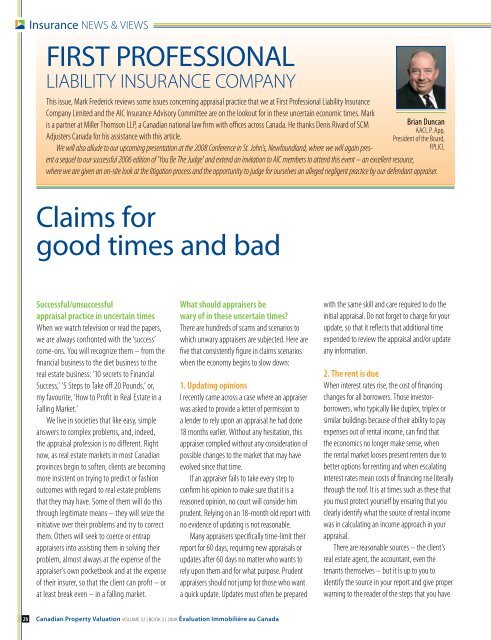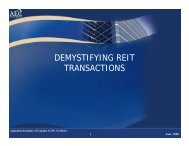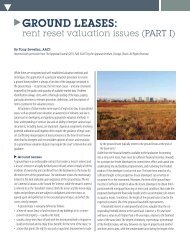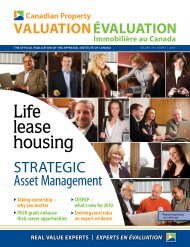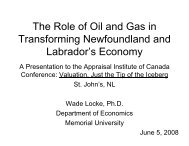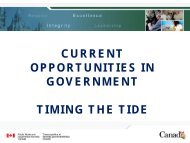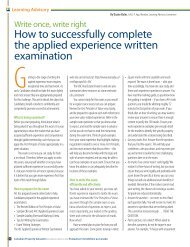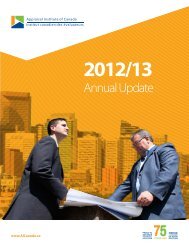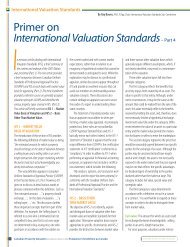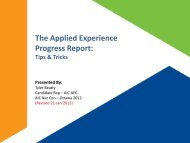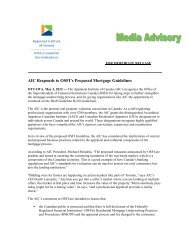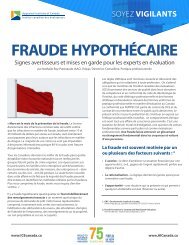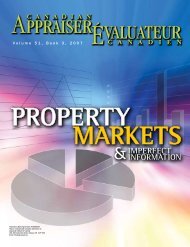Book 2 - Appraisal Institute of Canada
Book 2 - Appraisal Institute of Canada
Book 2 - Appraisal Institute of Canada
You also want an ePaper? Increase the reach of your titles
YUMPU automatically turns print PDFs into web optimized ePapers that Google loves.
Insurance news & views<br />
First Pr<strong>of</strong>essional<br />
Liability Insurance Company<br />
This issue, Mark Frederick reviews some issues concerning appraisal practice that we at First Pr<strong>of</strong>essional Liability Insurance<br />
Company Limited and the AIC Insurance Advisory Committee are on the lookout for in these uncertain economic times. Mark<br />
is a partner at Miller Thomson LLP, a Canadian national law firm with <strong>of</strong>fices across <strong>Canada</strong>. He thanks Denis Rivard <strong>of</strong> SCM<br />
Brian Duncan<br />
AACI, P. App,<br />
Adjusters <strong>Canada</strong> for his assistance with this article.<br />
President <strong>of</strong> the Board,<br />
We will also allude to our upcoming presentation at the 2008 Conference in St. John’s, Newfoundland, where we will again present<br />
a sequel to our successful 2006 edition <strong>of</strong> ‘You Be The Judge’ and extend an invitation to AIC members to attend this event – an excellent resource,<br />
FPLICL<br />
where we are given an on-site look at the litigation process and the opportunity to judge for ourselves an alleged negligent practice by our defendant appraiser.<br />
Claims for<br />
good times and bad<br />
Successful/unsuccessful<br />
appraisal practice in uncertain times<br />
When we watch television or read the papers,<br />
we are always confronted with the ‘success’<br />
come-ons. You will recognize them – from the<br />
financial business to the diet business to the<br />
real estate business: ‘10 secrets to Financial<br />
Success,’ ‘5 Steps to Take <strong>of</strong>f 20 Pounds,’ or,<br />
my favourite, ‘How to Pr<strong>of</strong>it in Real Estate in a<br />
Falling Market.’<br />
We live in societies that like easy, simple<br />
answers to complex problems, and, indeed,<br />
the appraisal pr<strong>of</strong>ession is no different. Right<br />
now, as real estate markets in most Canadian<br />
provinces begin to s<strong>of</strong>ten, clients are becoming<br />
more insistent on trying to predict or fashion<br />
outcomes with regard to real estate problems<br />
that they may have. Some <strong>of</strong> them will do this<br />
through legitimate means – they will seize the<br />
initiative over their problems and try to correct<br />
them. Others will seek to coerce or entrap<br />
appraisers into assisting them in solving their<br />
problem, almost always at the expense <strong>of</strong> the<br />
appraiser’s own pocketbook and at the expense<br />
<strong>of</strong> their insurer, so that the client can pr<strong>of</strong>it – or<br />
at least break even – in a falling market.<br />
What should appraisers be<br />
wary <strong>of</strong> in these uncertain times?<br />
There are hundreds <strong>of</strong> scams and scenarios to<br />
which unwary appraisers are subjected. Here are<br />
five that consistently figure in claims scenarios<br />
when the economy begins to slow down:<br />
1. Updating opinions<br />
I recently came across a case where an appraiser<br />
was asked to provide a letter <strong>of</strong> permission to<br />
a lender to rely upon an appraisal he had done<br />
18 months earlier. Without any hesitation, this<br />
appraiser complied without any consideration <strong>of</strong><br />
possible changes to the market that may have<br />
evolved since that time.<br />
If an appraiser fails to take every step to<br />
confirm his opinion to make sure that it is a<br />
reasoned opinion, no court will consider him<br />
prudent. Relying on an 18-month old report with<br />
no evidence <strong>of</strong> updating is not reasonable.<br />
Many appraisers specifically time-limit their<br />
report for 60 days, requiring new appraisals or<br />
updates after 60 days no matter who wants to<br />
rely upon them and for what purpose. Prudent<br />
appraisers should not jump for those who want<br />
a quick update. Updates must <strong>of</strong>ten be prepared<br />
with the same skill and care required to do the<br />
initial appraisal. Do not forget to charge for your<br />
update, so that it reflects that additional time<br />
expended to review the appraisal and/or update<br />
any information.<br />
2. The rent is due<br />
When interest rates rise, the cost <strong>of</strong> financing<br />
changes for all borrowers. Those investorborrowers,<br />
who typically like duplex, triplex or<br />
similar buildings because <strong>of</strong> their ability to pay<br />
expenses out <strong>of</strong> rental income, can find that<br />
the economics no longer make sense, when<br />
the rental market looses present renters due to<br />
better options for renting and when escalating<br />
interest rates mean costs <strong>of</strong> financing rise literally<br />
through the ro<strong>of</strong>. It is at times such as these that<br />
you must protect yourself by ensuring that you<br />
clearly identify what the source <strong>of</strong> rental income<br />
was in calculating an income approach in your<br />
appraisal.<br />
There are reasonable sources – the client’s<br />
real estate agent, the accountant, even the<br />
tenants themselves – but it is up to you to<br />
identify the source in your report and give proper<br />
warning to the reader <strong>of</strong> the steps that you have<br />
26<br />
Canadian Property Valuation Volume 52 | book 2 | 2008 Évaluation Immobilière au <strong>Canada</strong>


